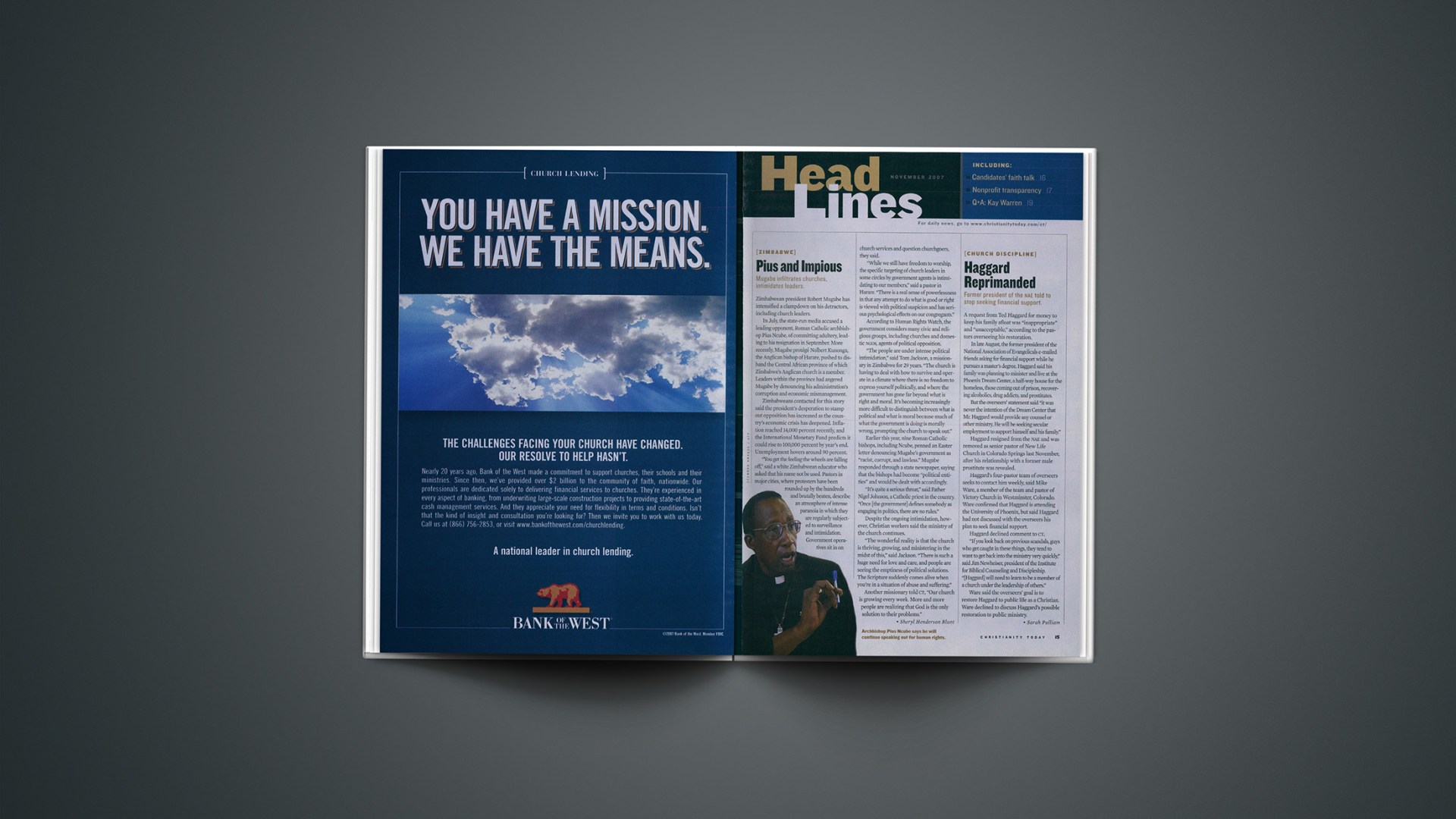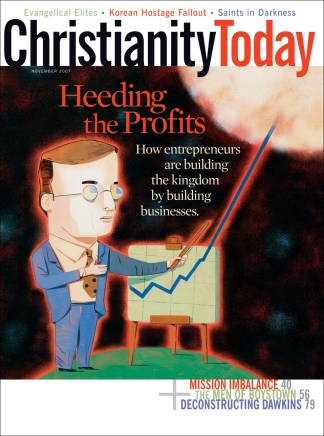Zimbabwean president Robert Mugabe has intensified a clampdown on his detractors, including church leaders.
In July, the state-run media accused a leading opponent, Roman Catholic archbishop Pius Ncube, of committing adultery, leading to his resignation in September. More recently, Mugabe protégé Nolbert Kunonga, the Anglican bishop of Harare, pushed to disband the Central African province of which Zimbabwe’s Anglican church is a member. Leaders within the province had angered Mugabe by denouncing his administration’s corruption and economic mismanagement.
Zimbabweans contacted for this story said the president’s desperation to stamp out opposition has increased as the country’s economic crisis has deepened. Inflation reached 14,000 percent recently, and the International Monetary Fund predicts it could rise to 100,000 percent by year’s end. Unemployment hovers around 90 percent.
“You get the feeling the wheels are falling off,” said a white Zimbabwean educator who asked that his name not be used. Pastors in major cities, where protesters have been rounded up by the hundreds and brutally beaten, describe an atmosphere of intense paranoia in which they are regularly subjected to surveillance and intimidation. Government operatives sit in on church services and question churchgoers, they said.
“While we still have freedom to worship, the specific targeting of church leaders in some circles by government agents is intimidating to our members,” said a pastor in Harare. “There is a real sense of powerlessness in that any attempt to do what is good or right is viewed with political suspicion and has serious psychological effects on our congregants.”
According to Human Rights Watch, the government considers many civic and religious groups, including churches and domestic NGOs, agents of political opposition.
“The people are under intense political intimidation,” said Tom Jackson, a missionary in Zimbabwe for 29 years. “The church is having to deal with how to survive and operate in a climate where there is no freedom to express yourself politically, and where the government has gone far beyond what is right and moral. It’s becoming increasingly more difficult to distinguish between what is political and what is moral because much of what the government is doing is morally wrong, prompting the church to speak out.”
Earlier this year, nine Roman Catholic bishops, including Ncube, penned an Easter letter denouncing Mugabe’s government as “racist, corrupt, and lawless.” Mugabe responded through a state newspaper, saying that the bishops had become “political entities” and would be dealt with accordingly.
“It’s quite a serious threat,” said Father Nigel Johnson, a Catholic priest in the country. “Once [the government] defines somebody as engaging in politics, there are no rules.”
Despite the ongoing intimidation, however, Christian workers said the ministry of the church continues.
“The wonderful reality is that the church is thriving, growing, and ministering in the midst of this,” said Jackson. “There is such a huge need for love and care, and people are seeing the emptiness of political solutions. The Scripture suddenly comes alive when you’re in a situation of abuse and suffering.”
Another missionary told CT, “Our church is growing every week. More and more people are realizing that God is the only solution to their problems.”
Copyright © 2007 Christianity Today. Click for reprint information.
Related Elsewhere:
Weblog has commentary and news links about Mugabe’s accusations and other developments in Zimbabwe.
The Catholic Church accepted Ncube’s resignation and assigned him a new job in September, according to the Catholic Information Service for Africa. Other articles include:
Zimbabwe bishop ‘victim of state’ | The Zimbabwean archbishop who resigned after allegations that he committed adultery has told the BBC that the charges were state orchestrated. (BBC News)
In quotes: Pius Ncube | Zimbabwe’s Roman Catholic Archbishop Pius Ncube, an outspoken critic of President Robert Mugabe, has resigned after an adultery scandal. (BBC News)
Our previous coverage of Mugabe’s Zimbabwe includes:
High-Stakes Protest | Church leaders confront President Mugabe. (May 7, 2007)
Zimbabwe Nightmare | Christians try to negotiate ministry in southern Africa’s most failed state. (March 1, 2006)
Sweeter Dreams | HIV infections decline in Zimbabwe. (March 1, 2006)










